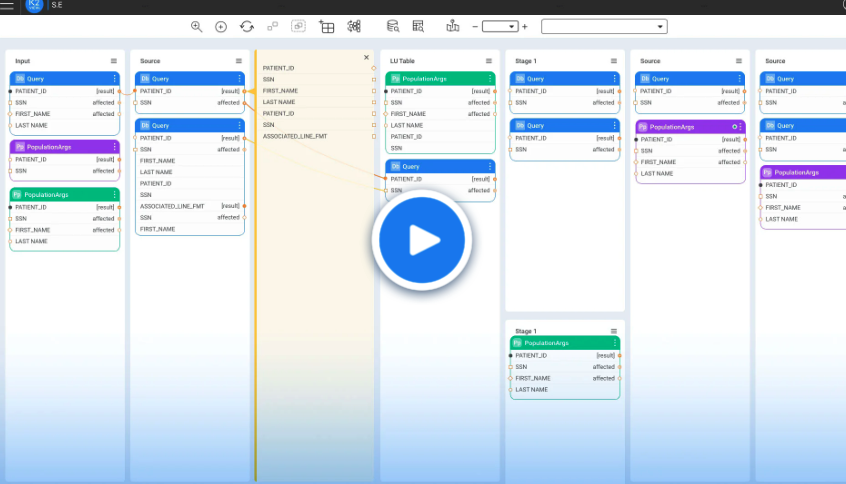If you’re considering an Integration Platform as a Service for your enterprise, keep the following challenges and requirements in mind.
Table of Contents
What is iPaaS and Why Do We Need it?
Enterprise iPaaS Challenges
Enterprise iPaaS Requirements
Data Fabric as a Service, the Ultimate Enterprise iPaaS
What is iPaaS and Why do we Need it?
iPaaS (Integration Platform as a Service) technology allows companies to standardize their data integration process and improve it. A single platform brings together various data sources that can be located in the cloud or on premises, and integrates them in a unified, optimized way. The iPaaS platform helps different roles across the organization, who may be more or less technology-oriented. iPaaS allows organizations to be more agile, efficient, and secure.
Enterprise iPaaS, also known as EiPaaS, does all of that and adds specific capabilities meant to support the unique needs of large organizations. EiPaaS solutions offer enterprise-grade scalability, security, availability, and support, which we’ll discuss in detail shortly. These solutions must cover every data integration need for all relevant teams, and work well with other technologies to create a smooth workflow.
Enterprise iPaaS Challenges
-
Data volume
The massive quantity of data associated with an enterprise is perhaps the most obvious iPaaS challenge, but it is also one of the most difficult ones to overcome. Today’s enterprises have more data to manage and integrate than ever before. They desperately need a platform that can scale with their business, and that consistently provisions high-quality data at any time.
Data must be available, at all times, to anyone in the organization.
-
Enterprise-wide accessibility
Today, multiple departments and roles within the organization rely on data for their business operations. This means that any data integration solution chosen by the enterprise must be user-friendly and accessible to all. Training and special skill requirements will create a burden for the company. At the same time, since we’ve mentioned the importance of compliance and data security, adequate authorization mechanisms should guarantee that the data is accessible only to those who are authorized to use it.
-
Fragmented solutions
When each department within the organization chooses its own data integration solution, the data may be out of sync. Multiple tools may not integrate well with one another, or speak the same language, requiring an innovative platform that promotes data literacy, in order to make sense of all the data. The transition to the cloud, and the rapidly expanding array of products, only contribute to this challenge.Many organizations choose to develop their own systems, which is typically time-consuming and expensive. Even after building such tools, companies struggle to integrate all the data successfully, and must constantly update their platform.
-
Compliance and regulation
Data privacy and security take center stage in today’s public climate, forcing global enterprises to meet strict requirements presented by regulators and users alike. Having offices in different locations worldwide exposes companies to more compliance demands, while working in regulated industries, such as financial services, healthcare, and telecommunications, adds to the risk. Enterprises cannot afford any data breaches, making security a primary challenge for data integration procedures and EiPaaS platforms.
Enterprise iPaaS Requirements
Now that we’ve covered the EiPaaS challenges, let’s examine the requirements you should be looking for
-
Scalability
iPaaS solutions should adapt to the volume of data coming in from various channels. As new sources are added to the mix, and companies produce even more data, the quality of the integration, and the resultant data, should never be compromised. -
Support for multiple, complex integrations
Enterprise iPaaS integration should unify many channels, including complex, new, and IoT-based sources.
The right EiPaaS enables non-techies to get at, and use, data easily.
-
User-friendly interface
The EiPaaS platform should be easy to use by both the business users and the data engineers in the organization, allowing less technology-oriented stakeholders to access and use the data. -
Support for flexible deployment models
iPaaS technology should cover cloud-native and on-premise sources, and be able to handle real-time data at any volume. The platform should also work well with today’s hybrid architectures and support all combinations of cloud-ground data delivery. The right platform easily integrates with leading cloud solutions and locally-hosted virtual architectures. -
Security and data privacy: Any iPaaS chosen by the enterprise should protect the data against fraud and breaches using innovative detection and authorization functionality. The platform should enable enterprises to comply with data privacy and security laws like GDPR, CCPA, and others.
-
End-to-end support
In addition to multiple data sources, the platform should support a wide variety of data-related procedures. These include design, integration, testing, automation, deployment, enrichment, transformation, and more.
Data Product Platform as a Service, the Ultimate Enterprise iPaaS
One platform that answers all of the above requirements, and more, is Data Product Platform, or Enterprise iPaaS Platform, when it's cloud-based. This patented, entity-based technology works smoothly with cloud-native or on-premise environments. It covers a wide range of use cases, at any scale, and from any source. Performance is enhanced thanks to business entity schemas managed by Micro-Databases™, enabling availability, scalability, and speed and at unprecedented levels.
Enterprise iPaaS Platform covers all the bases, by offering top data management capabilities for both operational and analytical workloads. It is the purest form of a single platform that integrates all applications and data, and allows enterprises to move with greater agility.







.png)






